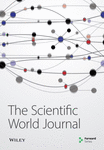Antibacterial Efficacy of Lytic Bacteriophages against Antibiotic-Resistant Klebsiella Species
Abstract
Bacterial resistance to antibiotics is a leading and highly prevalent problem in the treatment of infectious diseases. Bacteriophages (phages) appear to be effective and safe alternatives for the treatment of resistant infections because of their specificity for bacterial species and lack of infectivity in eukaryotic cells. The present study aimed to isolate bacteriophages against Klebsiella spp. and evaluate their efficacy against antibiotic-resistant species. Seventy-two antibiotic-resistant Klebsiella spp. were isolated from samples of patients who referred to the Ghaem Hospital (Mashhad, Iran). Lytic bacteriophages against Klebsiella spp. were isolated from wastewater of the septic tank of the same hospital. Bactericidal activity of phages against resistant Klebsiella spp. was tested in both liquid (tube method; after 1 and 24 h of incubation) and solid (double-layer agar plate method; after 24 h of incubation) phases. In each method, three different concentrations of bacteriophages (low: <104 PFU/mL, medium: 104–107 PFU/mL, and high: > 107 PFU/mL) were used. Bacteriophages showed promising bactericidal activity at all assessed concentrations, regardless of the test method and duration of incubation. Overall, bactericidal effects were augmented at higher concentrations. In the tube method, higher activity was observed after 24 h of incubation compared to the 1-h incubation. The bactericidal effects were also higher in the tube method compared to the double-layer agar plate method after 24 h of incubation. The findings of the present study suggest that bacteriophages possess effective bactericidal activity against resistant Klebsiella spp. These bactericidal activities are influenced by phage concentration, duration of incubation, and test method.




